Summary Notes
Take a proactive approach not only to problem solving but also to your life
Have a vision of what you want you want to accomplish in your organization and in your life and make sure all the steps you take are in the right direction
Don't be afraid to fail. No one bats a thousand and most of the time we can learn more from our failures than we do from our successes
Observe good problem solvers. Ask them questions and brainstorm with them
Don't dismiss ideas of others out of hand, leverage these ideas-they may trigger the correct solution
Get in the habit of planning your time and prioritizing the tasks you must accomplish
Practice using the tools and techniques present in the book. A tool only becomes useful when you are comfortable and familiar with it. Some techniques may sound silly or cumbersome. Don't worry. The same techniques will not work for everyone and every situation. Choose what works best for you.
Don't force-fit a certain technique that you have used before. If it's not working choose another or move on.
When you have finished a task, reflect on it. Evaluate it. Is it the best you could have done? If not, can you still improve upon it?
Every time you practice the problem-solving techniques we have presented, you become an even better problem solver.
Job Card: A Heuristic
